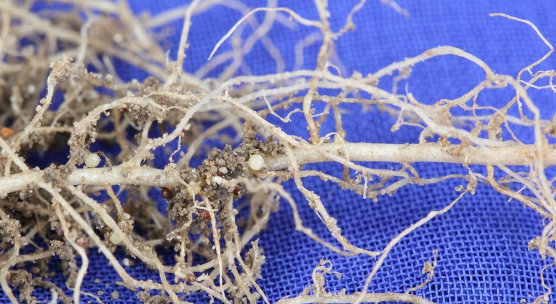Researchers make technological breakthrough against potato cyst nematode
Published On Fri 30 Oct 2015 by Grant Hill

A new study by UK scientists has the potential to deal with roundworm infestation that costs the UK agricultural industry £50million a year.
Potato cyst nematodes (PCN) are a significant threat to the UK fresh and processing potato markets, but the new study takes science a step closer towards managing the PCN problem by mapping different population “types” at scales from whole landscapes to areas within a field with unprecedented accuracy.
Two species of PCN, G. rostochiensis and G. pallida,are responsible for most PCN-related losses in temperate potato growing regions. While the former has been successfully controlled through the deployment of resistant cultivars, G. pallida remains a significant threat to potato production and is a particular concern for the protection of seed potato land in Scotland. Populations of G. pallida in the UK differ in their ability to reproduce on different potato cultivars.
Researchers from the James Hutton Institute, Science and Advice for Scottish Agriculture (SASA), Scottish Agronomy Ltd and the Universities of Dundee, Leeds, Edinburgh and St Andrews, with funding from BBSRC, the Scottish Government and the Scottish Society for Crop Research, have developed the technique which in the future may help growers to choose the most appropriate potato varieties for cultivation, by countering the “type” of G. pallida in a field with the cultivar exhibiting the most resistance to that “type”.
Dundee’s Dr Sebastian Eves-van den Akker, leading author of the study, said: “This study is an excellent example of linking universities and government funded research institutions to address a high-value problem, while demonstrating the potential power of utilising genomics to inform farming.”
“While developing a method for accurate, quantitative typing of PCN in a thousand fields simultaneously, we have also revealed insights into the national genetic diversity of an economically important pest.”
Professor Ian Toth, Controlling Pests and Diseases research theme leader at the James Hutton Institute, commented: “With continued reductions in the availability of nematicides, new sustainable solutions are desperately needed to control these economically important pests.
“This ground-breaking research is the first step towards finding an alternative strategy towards pest control that will ensure a vibrant future for the potato industry as well as affordable and nutritious food on our table.”
This discovery builds on other innovative work by the James Hutton Institute working with SASA that introduced the first high-throughput molecular screening approach in Europe for PCN surveillance of Scottish soils.
The paper “A metagenetics approach to determine the diversity and distribution of cyst nematodes at the level of the country, the field and the individual” will be available in the December issue of the journal Molecular Ecology.
For media enquiries contact:
Grant Hill
Press Officer
University of Dundee
Nethergate, Dundee, DD1 4HN
Tel: +44 (0)1382 384768
Mobile: 07854 953277
Email: g.hill@dundee.ac.uk